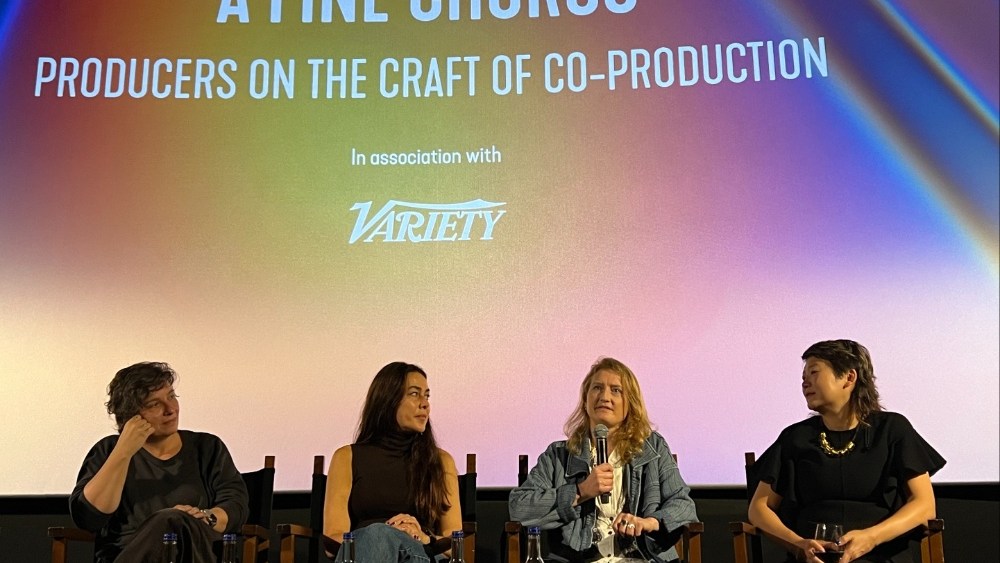The U.K.’s film tax credit scheme is emerging as a major draw for international co-productions, helping the country shed its reputation for challenging legal structures and complex financing requirements, according to a panel of leading producers at the BFI London Film Festival.
“Great Britain comes with so many opportunities,” said Polish producer Klaudia Śmieja-Rostworowska of Madants Film, noting that the British tax credit is “an exceptional one” that has helped European filmmakers understand how to structure bigger films while maintaining cultural proximity. “It’s really worth to do with UK first before you jump into bigger the U.S. market.”
“Great Britain is the first stop when we dream about Hollywood,” Śmieja-Rostworowska added. “Everyone does have this dream, no matter how much you try to avoid. Yes, everyone wants to go there because the money seems to be great. Everyone wants to have their films to be distributed in the States. And it’s very natural that we want to have this.”
The praise for U.K. incentives came during a discussion on international co-productions at the festival’s industry forum, featuring producers behind several festival titles including “Sentimental Value,” “Orphan,” “Dreamers,” and “Diamonds in the Sand.”
Emily Morgan of London-based Quiddity Films emphasized the attraction of U.K. financing sources, particularly for minority co-producers. “The sources of money that come from here are attractive these days, and I think the crews are brilliant,” she said, while acknowledging that “there’s no denying that the legals are intense.”
Morgan, whose credits include “The Settlers” and “I’m Not a Witch,” is wrapping production on “The Wolf Will Tear Your Immaculate Hands” in Belfast, bringing a Swedish-Icelandic-Belgian production to Northern Ireland. The U.K. component represented 30% of the financing, leveraging the country’s tax credit along with the BFI’s Global Screen Fund and Northern Ireland Screen support.
The Global Screen Fund, established after Brexit to replace Creative Europe funding, has proven particularly valuable for U.K. producers seeking to participate in international projects. “When Brexit happened, I was about to move to Amsterdam to be a European producer,” Morgan revealed. “But then the global screen fund… started making my co-producing dreams come true.”
The panel illuminated the complex realities of assembling international co-productions, with producers describing structures ranging from two countries to as many as nine on a single film.
Maria Ekerhovd of Norway’s Mer Film detailed the financing of “Sentimental Value,” the new film from Joachim Trier (“The Worst Person in the World”), which brought together five countries. Norway held 60% of the budget, with France at 20%, and Sweden, Denmark, and Germany splitting the remainder. Crucially, approximately 70% came from soft money – public funding sources – ensuring creative freedom.
“We started the financing really before we had anything,” Ekerhovd explained. The project’s prestigious pedigree allowed the producers to be strategic about which partners to invite, rather than having to convince reluctant financiers.
Producer and Asian Film Alliance Network Secretary General Lorna Tee described even more complex arrangements, including work on the Cannes title “Viet and Nam” that required coordinating nine co-producers. For “Diamonds in the Sand,” her current film at the festival, she assembled a Philippines-Japan co-production with 70% Filipino financing and 30% Japanese funding.
Despite the technical complexities, all four producers emphasized that personal connections and trust matter more than contractual frameworks when selecting co-production partners.
“I hate this loneliness in the business,” Śmieja-Rostworowska said, explaining her preference for horizontal partnership structures where all producers maintain equal creative input, rather than vertical arrangements with a single decision-maker. “Choosing the partners, those partners, physical partners that will be your colleagues for another five years, is a crucial thing for me.”
Tee stressed the importance of informal vetting: “Eating together is really important in Asia… you get to know people very differently when you see them at a state of relaxation.”
The producers cautioned against pursuing co-productions solely for financial reasons. “I’m not so sure whether convincing people to do five, six countries is such a good idea,” Śmieja-Rostworowska said, noting that administrative burdens and delayed cash flows can outweigh the benefits of additional funding.
The panel offered frank assessments of relationships with sales agents, describing them as “instrumental” but acknowledging tensions in the partnership dynamics.
“Sometimes, as a producer, you feel it’s very unfair, because both [sales agents] and distributors, they come in often quite late, and they get out early, and they always earn money on the project, and very rarely we do,” Ekerhovd said. However, she credited MK2 Films’ early involvement in “Sentimental Value” as crucial to achieving the necessary budget level through pre-sales and bringing in additional financiers.
Tee noted the current challenges facing sales companies while warning producers to research how agents treat debut directors. “Some sales agents… really suck at dealing with a first time debut director, because they want 2000 euros per screening fee for every festival,” she said, adding that this can conflict with a producer’s goal of maximizing festival exposure.
The discussion briefly touched on potential U.S. tariffs but producers largely dismissed immediate concerns, with Śmieja-Rostworowska noting that after “a week of panic,” the industry moved on.
When asked about favorite co-production markets, Rotterdam and Berlin drew the most mentions, though Śmieja-Rostworowska praised the London Film Festival’s industry program for allowing more focused business conversations.

